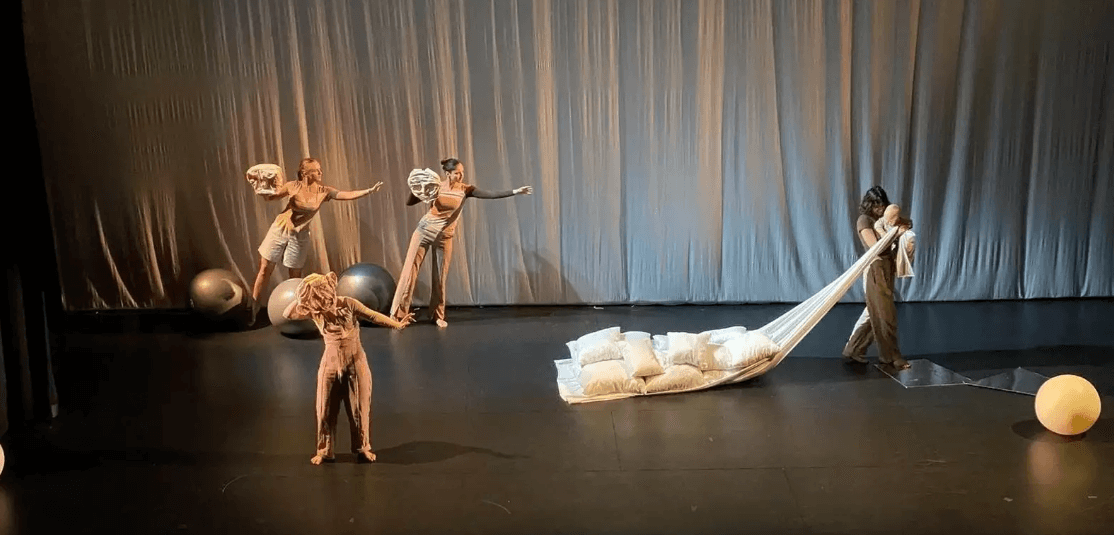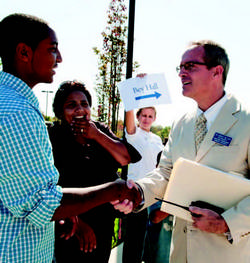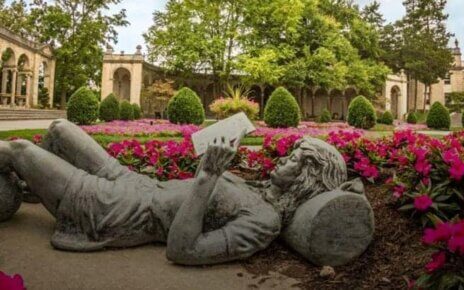Monmouth’s School of Humanities and Social Sciences, Department of Communication, Center for Arts, and the Intercultural Center sponsored Mothermotherland, an original performance by Slovo. Theater Group, in Pollak Theatre on Wednesday, Nov. 2.
Slovo. Theatre Group is made up of Ukrainian and American actors, playwrights, and directors who have adapted the work of Ukrainian author Mykola Khyvylovy into an original performance. This act also draws inspiration from the artists’ own personal experiences and the present-day war in Ukraine.
Mothermotherland featured Audrey Rose Dégez, Lili Maritchka Dégez (Audrey’s 6-month-old daughter), Daria Holovchanska, Yulia Linnik, Olesia Zakharova, and Veronika Shuster— all of whom played a role in crafting the performance.
Dégez, playwright and manager of the project, noted how central collaboration is to the group’s creative making process. “We all co-write and co-direct,” she said.
Although she is one of Mothermotherland’s point leads, Dégez made sure not to take any personal credit, emphasizing that the show is a Slovo. Theater Group creation.
Joe Rapolla, Specialist Professor and Chair of the Music and Theatre Arts Department summarized the meaning behind the play, “It was a powerful message detailing the struggle of war and the despair of oppressive authority, complicated by the joy and sacrifice of motherhood and family.”
Deanna Shoemaker, Associate Professor of Communication and Performance Studies, commented on the professionalism of the performance. She began, “These college-aged performers have so much to lose, and it was clear that they fear for their families, loved ones, homes, and their own futures…I was so struck by their resilience, talent, and knowledge of their own history.”
After Slovo. Theater Group’s performance, the audience and cast members participated in a talk-back.
Performer Shuster began, “There are these expectations that one’s motherland place will take care of you and make you feel safe and comfortable…We don’t feel safe in our motherland.”
Shuster likewise explained how the ‘motherland’ and the concept of a mother figure are intertwined themes throughout the performance.
Audience members asked the artists were why a mother figure is so idealistic in society.
“It’s this idea of something that can’t hurt and will always be there for us and heal all our pain and catch us before we fall,” Dégez answered.
According to Linnik, the performance consists of two parts; one demonstration the group’s realities to the audience, and the other playing a character.
She added, “We used our realities, and sometimes traumatic experiences, about Ukraine and turned it into an artistic performance to spread awareness.”
Evidently, the performance left an impact on some audience members.Shoemaker reflected, “Art helps to humanize tragedies, and these young artists’ perspectives allow U.S. audiences to better understand Ukrainian history, their strong cultural identity, and the power of artists to collectively resist oppression and maintain hope.”
“They are actors, producers, directors, writers, performance artists, and activists making a difference. They have bravely traveled from their homeland to the U.S. to elevate the story of this war and its historical context, in a language they are still learning,” she expanded.
Rapolla concurred, “It’s important to experience music, theater, art in all forms, from artists, writers and creators from outside our area, our culture and our country. The perspective of others gives us a more worldly view and enables us to bring that back to our students, colleagues and community.”
An audience member and Communications student, Sydney Cherwien, said, “I really enjoyed this performance. I have no previous knowledge on this topic about Ukraine, and after seeing it, I feel more informed and understanding of the terrible situation that the people of Ukraine are going through. It was a moving and educational performance.”
“Works such as this remind us that our corner of the world is just that, a small, fortunate, geographically protected place. It gives us the opportunity to begin to have empathy for the challenges others face, and an increased appreciation of the many benefits inherent to a developed western society,” reminded Rapolla.
Shoemaker concluded, “During such a devastating and dangerous war in Ukraine that has had and will continue to have a long-term global impact, this event felt very necessary. This personal and political performance works to amplify Ukrainian voices and challenge U.S. audiences to pay closer attention to this war that impacts all of us.”




